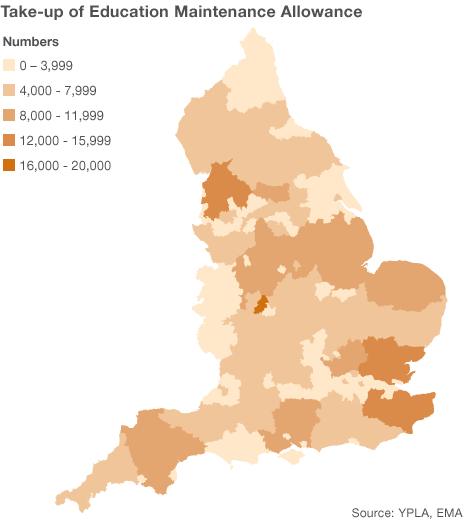Labour loses vote to stop scrapping of EMA grants
- Published
Andy Burnham: EMA is "about people making the best of themselves"
Labour has lost its attempt in the House of Commons to reverse plans to scrap the Education Maintenance Allowance in England.
The government won by a majority of 59 votes - having argued that the allowance to keep teenagers in education was poorly targeted.
Labour's education spokesman, Andy Burnham, told MPs that social mobility would be "thrown into reverse".
A protest against cutting the allowance was staged in central London.
MPs have been debating a call from Labour for the government to rethink its plans to remove the means-tested allowances of between £10 and £30 per week.
Spending priority
Mr Burnham said it was an attack on the aspirations of young people.
But Education Secretary Michael Gove said the grant had been "poorly targeted" and told MPs "you cannot spend money you do not have".
"Choices are dependent on the money - and where is the money coming from?" said Mr Gove.
"If we really believe in generating social mobility in this country then the question we have to ask ourselves is - how is every pound best invested?" said Mr Gove.
Mr Burnham had warned that too many MPs were out of touch with the reality of the pressures facing these low-income families who received allowances.
Stopping the allowances would mean "stacking the odds" against young people - and "kicking away the ladder of opportunity", Mr Burnham told MPs.
Protests
Students held protests against scrapping the allowance - including a group of students who held classes in a room in the Houses of Parliament.
Several hundred people took part in a peaceful march in central London.
The ASCL head teachers' union criticised the scrapping of the allowances as "absolutely the wrong move" and a "false economy".
Education Maintenance Allowances (EMAs) were introduced by Labour to encourage young people from deprived backgrounds to stay in education and training after the age of 16.
Depending on their parents' income, students receive payments of £10, £20 or £30 a week.
Wales and Scotland also have the payment, which is under review in Northern Ireland.
The allowances could be spent however the student chooses, but were intended to cover the cost of course equipment, books and transport.
Campaigners warned that many students will drop out of courses, and others will not be able to afford to start them, if the allowance is cut as planned.
But a spokesman for the Department for Education said: "EMA is a hugely expensive programme, costing over £560m a year, with costs of administration amounting to £36 million."
The education department also said research showed that 90% of young people receiving the allowance would continue in education even if the grant was stopped.
'Vital lifeline'
National Union of Students' president, Aaron Porter, warned that the EMA was a "vital lifeline" for young people which could help keep them in education and out of unemployment.
Save the Children said that scrapping EMA "will have a worse impact on the poorest pupils than increasing tuition fees".
Michael Gove: "The current arrangements for the Education Maintenance Allowance are poorly targeted"
Labour argued in its Commons motion that EMA gives the poorest young people the choice of going to the best colleges in their area, by helping with transport costs.
Mr Burnham also accused the Conservatives of breaking a pre-election promise that there were "no plans" to scrap EMA.
The education secretary was pressed by MPs to apologise - but Mr Gove blamed the financial deficit which he said had been the responsibility of the previous government.
The Conservative chairman of the Education Select Committee, Graham Stuart, said the nation's finances meant a "diet of hard decisions".
As such he said it was "hard to see that EMA is a sensible use of a scarce resource".
But Mr Stuart said that it would be important for any replacement scheme to consider travel costs for young people in rural areas.
His predecessor as select committee chairman, Barry Sheerman, said that scrapping EMA was a "shameful day" and that allowing more students to drop out of education would prove more expensive for the economy.
Research by the University and College Union, published on Tuesday, suggested that 70% of students in the poorest areas would drop out of college if their EMA was stopped.
The government says it now plans to support the most needy students through a discretionary fund administered by colleges, which it has said it hopes to triple from its current level of £26m.

- Published18 January 2011
- Published19 January 2011
- Published28 March 2011
- Published17 January 2011